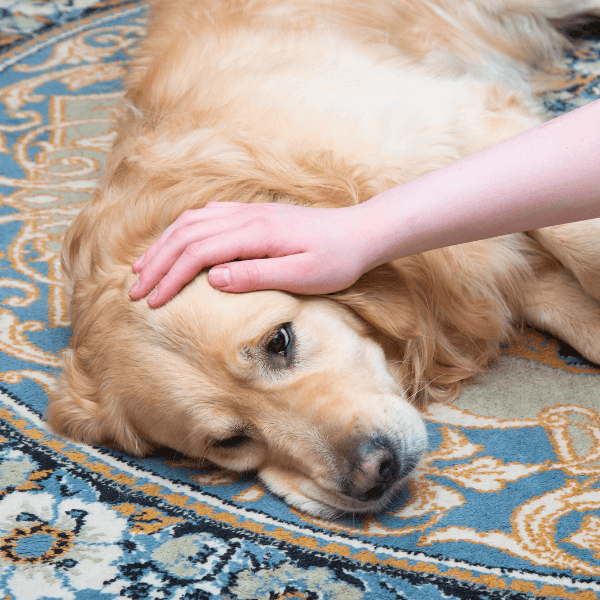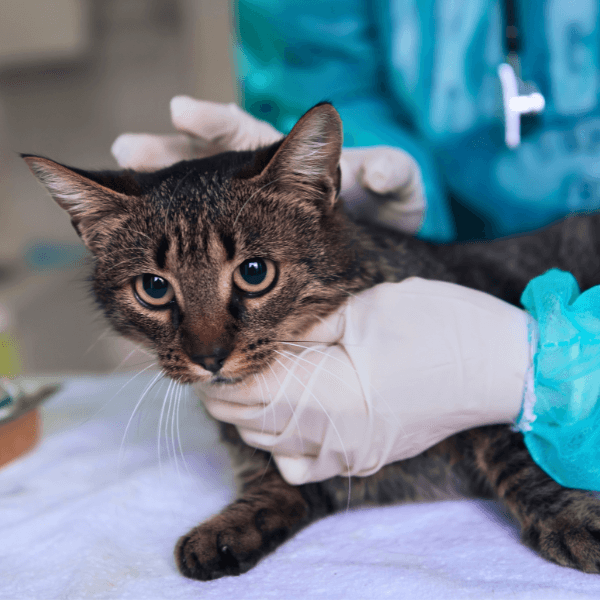
Presented in collaboration with Purina® Pro Plan®
Diarrhea and vomiting: taking the appropriate measures
Gastrointestinal disorders can affect our four-legged companions, taking the form of diarrhea and vomiting. While these symptoms are often benign in healthy adult animals, they can be dangerous for puppies and kittens, as well as for an adult animal if the problem does not resolve itself after a few days.
If you are worried about your animal’s health, never hesitate to contact a veterinary clinic or emergency animal hospital. There is no charge for asking questions over the phone. This simple action can give you peace of mind, provide basic advice on how to monitor your animal’s condition, and help you assess the urgency of the situation. Animal health professionals are best placed to guide you in getting your animal back on their paws quickly.
Is your dog or cat showing symptoms of gastrointestinal problems? You can take the following precautions as soon as the first signs appear, to give your animal relief and reduce the risk of complications.
- Observation: If your dog has diarrhea but is otherwise in good general condition (i.e. alert, eating well, drinking, etc.), you can wait 24 hours to see if the situation resolves itself.
- Food and hydration: make sure your dog stays well hydrated, and, to help their digestive system recover, you can offer them a diet specially formulated for gastrointestinal disorders (canned or kibble); this is an excellent option, and easy on the stomach. A temporary homemade diet of white rice mixed with chicken without fat or spices, or with unseasoned lean minced meat, is also sometimes recommended.
- Probiotics: a probiotic supplement, such as FortiFlora, can also help rebalance the gut flora.
- Supervision: when outside, keep your dog on a leash so that you can watch them closely and prevent them from eating anything inappropriate, which could worsen their condition.
- Food and hydration: if your dog is vomiting, but is otherwise in good condition, make sure they stay well hydrated, and give them small portions of food throughout the day. A canned food specially formulated for gastrointestinal disorders is easy on the stomach and is an excellent option to keep your dog hydrated. A temporary homemade diet of white rice mixed with chicken without fat or spices, or with unseasoned lean minced meat, is also sometimes recommended.
- Supervision: when outside, keep your dog on a leash so that you can watch them closely and prevent them from eating anything inappropriate, which could worsen their condition.
- Please note: it is important to distinguish between vomiting and simple regurgitation, which occurs just after a meal, when an animal has eaten too quickly, for example, and consists of undigested food. In such a case, a slow feeding bowl could help solve the problem! If regurgitation persists, don’t wait too long before seeking veterinary advice.
- Prescription food: if your cat has diarrhea but is otherwise healthy, you can purchase a small bag of kibble and a few cans of food specially formulated for gastrointestinal disorders from your local veterinary clinic.
- Probiotics: adding a probiotic supplement to their diet, such as FortiFlora, can also help rebalance the gut flora.
- Prescription food: if your cat is vomiting, but is otherwise in good condition, you can purchase a small bag of kibble and a few cans of food specially formulated for gastrointestinal disorders from your local veterinary clinic.
- Hairballs: if your cat’s vomit consists mainly of clumps of hair, it’s possible that it’s due to an accumulation of hair in their stomach. Cats swallow a lot of hair when grooming themselves. Although it is not worrying for a cat to regurgitate a hairball from time to time, this should not happen regularly (more than around once a month). Don’t hesitate to seek advice from a veterinary clinic.
- No fasting, unless recommended by a veterinarian. Make sure your cat has access to small amounts of food at regular intervals.
- Please note: it is important to distinguish between vomiting and simple regurgitation, which occurs just after a meal, when an animal has eaten too quickly, for example, and consists of undigested food. Knowing the difference could help your vet better target the cause of your cat’s digestive problems.


When should you consult a veterinarian?

- If your animal is young: puppies and kittens are particularly vulnerable. A veterinary consultation is strongly recommended.
- If your animal is showing other signs of discomfort such as lethargy (a severe drop in energy), fever, pain, whimpering, etc.
- If your animal refuses to eat or drink.
- If there is blood in your animal’s vomit or faeces.
- If symptoms persist for more than 24 hours, or if you have already tried all the options described above and your animal’s condition deteriorates, you should consult a veterinarian.
- Vomiting is much more worrisome than diarrhea alone, especially if it is accompanied by diarrhea. Any vomiting, loss of appetite or change in energy levels that lasts longer than 24 hours may warrant a visit to your veterinarian. Diarrhea on its own, on the other hand, is less worrying than vomiting, provided it does not last for longer than two or three days at most.
For more detailed guidance on managing gastrointestinal disorders, please refer to the recommendations of the Ordre des médecins vétérinaires du Québec (OMVQ) here.
Several factors can cause or aggravate gastroenteritis in dogs and cats. Here are the main ones:
- Inappropriate diet: ingestion of spoiled food, waste, or food that is not recommended for animals.
- Sudden change in diet: a change in diet that is not introduced gradually can disrupt the digestive system.
- Intestinal parasites: worms, for example, can cause digestive disorders.
- Bacterial or viral infections: some infectious diseases, such as parvovirus in dogs or panleukopenia in cats, directly affect the digestive system.
- Ingestion of toxic substances: household products, toxic plants, pesticides or medications.
- Ingestion of a foreign body: a toy, piece of fabric or other inedible object (such as a sock!) can cause digestive irritation or obstruction, leading to symptoms of gastroenteritis.
- Stress: stressful situations or changes in the environment can upset your animal’s digestive balance.
- Food allergies or intolerances: some animals may react to ingredients in their food.
- Metabolic diseases or inflammatory digestive disorders: if your veterinarian diagnoses your animal with such a disease/disorder, treatments adapted to them will be prescribed.
One of the risks of gastroenteritis is dehydration. When your animal loses a lot of fluid through vomiting or diarrhoea, their water balance can rapidly deteriorate. Puppies and kittens can become dehydrated much more quickly than adult animals and may need prompt veterinary care.
An ounce of prevention is worth a pound of cure
The best way to prevent gastroenteritis in your animal is to adopt a balanced and vigilant approach. Give your animal a diet suited to their needs and introduce any dietary changes gradually, with your vet’s guidance. Make sure your animal does not have access to inappropriate food, garbage or toxic substances. Regular deworming is essential to limit the risk that your animal may pick up intestinal parasites. Lastly, minimize stressful situations and make sure your animal enjoys a stable, secure environment. These precautions will reduce the risk of digestive problems and promote your animal’s overall health.
Do you want to learn more about how a balanced diet can boost your animal’s health? Take a look at our article on the importance of a healthy diet for dogs and cats.
Thank you for taking care of your animal! ❤️
Sources:
Ordre des médecins vétérinaires du Québec (OMVQ) :
https://www.omvq.qc.ca/conseils-pour-vos-animaux/chiens/1032-6-tout-savoir-sur-la-gastro-enterite.html
Merck Manual – Veterinary Manual :
https://www.merckvetmanual.com/digestive-system/digestive-system-introduction/infectious-diseases-of-the-gi-tract-in-animals?utm_source=chatgpt.com
PetMD :
https://www.petmd.com/dog/conditions/digestive/gastroenteritis-dogs-symptoms-recovery-and-more
https://www.petmd.com/dog/symptoms/is-my-dog-dehydrated
VCA Canada Animal Hospitals :
https://vcacanada.com/know-your-pet/gastroenteritis-in-dogs
https://vcacanada.com/know-your-pet/liver-disease-fatty-liver-syndrome-in-cats
VCA Animal Hospitals :
https://vcahospitals.com/know-your-pet/gastroenteritis-in-dogs?utm_source=chatgpt.com







